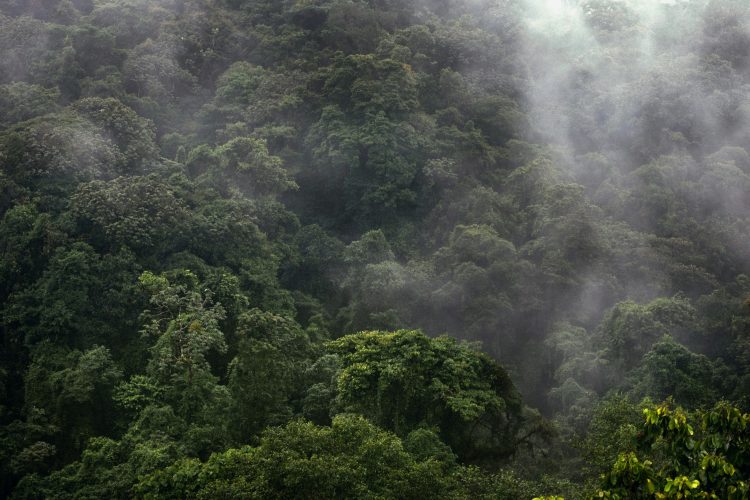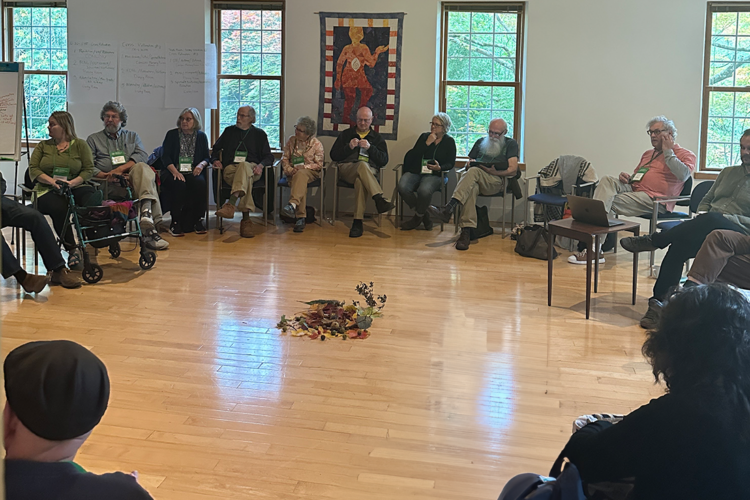Praise Be!
By Rachel Findley and Shelley Tanenbaum
In this Encyclical, I would like to enter into dialogue with all people about our common home. [3] 1
Laudato Si’, the letter Pope Francis wrote to us all, surprises us with its overarching emphasis on how “everything is connected,” including justice in human societies, the rest of the natural world, and the deep relationship with the sacred.
Members of the media have been calling it “the climate encyclical” but it goes far beyond that to a nuanced discussion of human responsibility for, and response to, climate change. Francis seeks to get “to the roots of the present situation, so as to consider not only its symptoms but also its deepest causes.” [15] The encyclical is a prophetic call for justice in human society, which is always enfolded in the natural world.
We did not just resonate with Francis’ words but were moved to the point of tears by their clarity and harmony with our own relationships with nature and humanity. With very few exceptions, his words were like a symphony for our hearts. We have chosen to highlight and share passages that rang true for us, and mostly, we have let Francis provide the message with his own words.2
Francis regards the degradation of the environment as a symptom of disordered relationship.
Because all creatures are connected, each must be cherished with love and respect, for all of us as living creatures are dependent on one another. [42]
Human beings too are creatures of this world, enjoying a right to life and happiness, and endowed with unique dignity. So we cannot fail to consider the effects on people’s lives of environmental deterioration, current models of development and the throwaway culture. [43]
He sees the exclusion of the poor and the exclusion of the environment as deeply connected.
The human environment and the natural environment deteriorate together; we cannot adequately combat environmental degradation unless we attend to causes related to human and social degradation. [48]
To heal our relationships, Francis encourages us to savor and restore the mystical connection that joins humans, the creation, and the divine.
The universe unfolds in God, who fills it completely. Hence, there is a mystical meaning to be found in a leaf, in a mountain trail, in a dewdrop, in a poor person’s face. The ideal is not only to pass from the exterior to the interior to discover the
action of God in the soul, but also to discover God in all things. [233]
Our relationships are systemically eroded. A throwaway culture discards both the excluded of society and things that have no immediate use. Extreme poverty appears along with overconsumption by the richer sectors in a dysfunctional system that does not promote well-being for all.
Developing countries, where the most important reserves of the biosphere are found, continue to fuel the development of richer countries at the cost of their own present and future. …access to ownership of goods and resources for meeting vital needs is inhibited by a system of commercial relations and ownership which is structurally perverse. [52]
It is not possible to sustain the present level of consumption in developed countries and wealthier sectors of society, where the habit of wasting and discarding has reached unprecedented levels. The exploitation of the planet has already exceeded acceptable limits and we still have not solved the problem of poverty. [27]
For those in the stream of consumer culture, distraction feeds frantic attempts to fill a void with
meaningless activity and needless stuff.
A constant flood of new consumer goods can baffle the heart and prevent us from cherishing each thing and each moment. [222]
Since the market tends to promote extreme consumerism in an effort to sell its products, people can easily get caught up in a whirlwind of needless buying and spending… Amid this confusion, postmodern humanity has not yet achieved a new self-awareness capable of offering guidance and direction. [203]
The current global situation engenders a feeling of instability and uncertainty, which in turn becomes “a seedbed for collective selfishness.” When people become self-centered and self-enclosed, their greed increases. The emptier a person’s heart is, the more he or she needs things to buy, own and consume. [204]
A false paradigm of progress misguides the creative power of technology.
A certain way of understanding human life and activity has gone awry. [101]
We have the freedom needed to limit and direct technology; we can put it at the service of another type of progress, one which is healthier, more human, more social, more integral…. An authentic humanity, calling for a new synthesis, seems to dwell in the midst of our technological culture, almost unnoticed, like a mist seeping gently beneath a closed door. Will the promise last, in spite of everything, with all that is authentic rising up in stubborn resistance? [112]
Crisis calls us to turn again.
The ecological crisis is also a summons to profound interior conversion. [217]
We are called to a prophetic and contemplative lifestyle, one capable of deep enjoyment free of the obsession with consumption. [222]
Those who enjoy more and live better each moment are those who have given up dipping here and there, always on the look-out for what they do not have. They experience what it means to appreciate each person and each thing, learning familiarity with the simplest things and how to enjoy them. [223]
Francis’ call is like the Quaker understanding of the Light that, when it reveals the filth that has been hidden, also gives the wisdom and courage to transform our ways. When the systems of power entangle us, a greater power can untie the knots.
All is not lost. Human beings, while capable of the worst, are also capable of rising above themselves, choosing again what is good, and making a new start… We are able to take an honest look at ourselves, to acknowledge our deep dissatisfaction, and to embark on new paths to authentic freedom. No system can completely suppress our openness to what is good, true and beautiful, or our God-given ability to respond to his grace at work deep in our hearts. I appeal to everyone throughout the world not to forget this dignity which is ours. No one has the right to take it from us. [205]
The Dalai Lama, endorsing Francis’ encyclical, called us to “Say more. We have to make more of an effort.” Let our lives speak. Speak Truth to Power.
1 Numbers refer to the specific paragraph in Laudato Si’ (http://w2.vatican.va/content/francesco/en/encyclicals/documents/papa-francesco_20150524_enciclica-laudato-si.html ).
2 Although the paragraphs on population, gendered language for God, and the trinity will represent significant points of disagreement for many Friends, we note that these paragraphs are not the primary message of the encyclical.
Find Out More: Quakers
and Climate Change
A list of religious statements on climate change can be found on the Interfaith Power and Light website: http://www.interfaithpowerandlight.org/resources/religious-statements-on-climate-change/.
The Quaker statement on climate change has now been endorsed by more than 45 Meetings and organizations worldwide: http://www.quakerearthcare.org/article/june-2015-facing-challenge-climate-change-shared-statement-quaker-groups.

